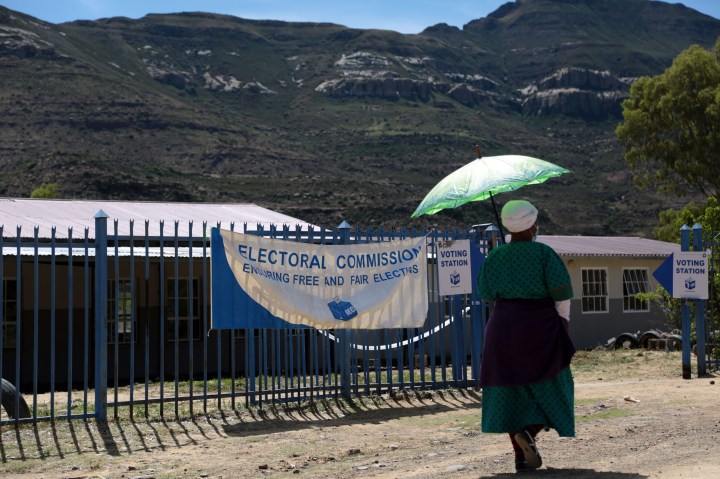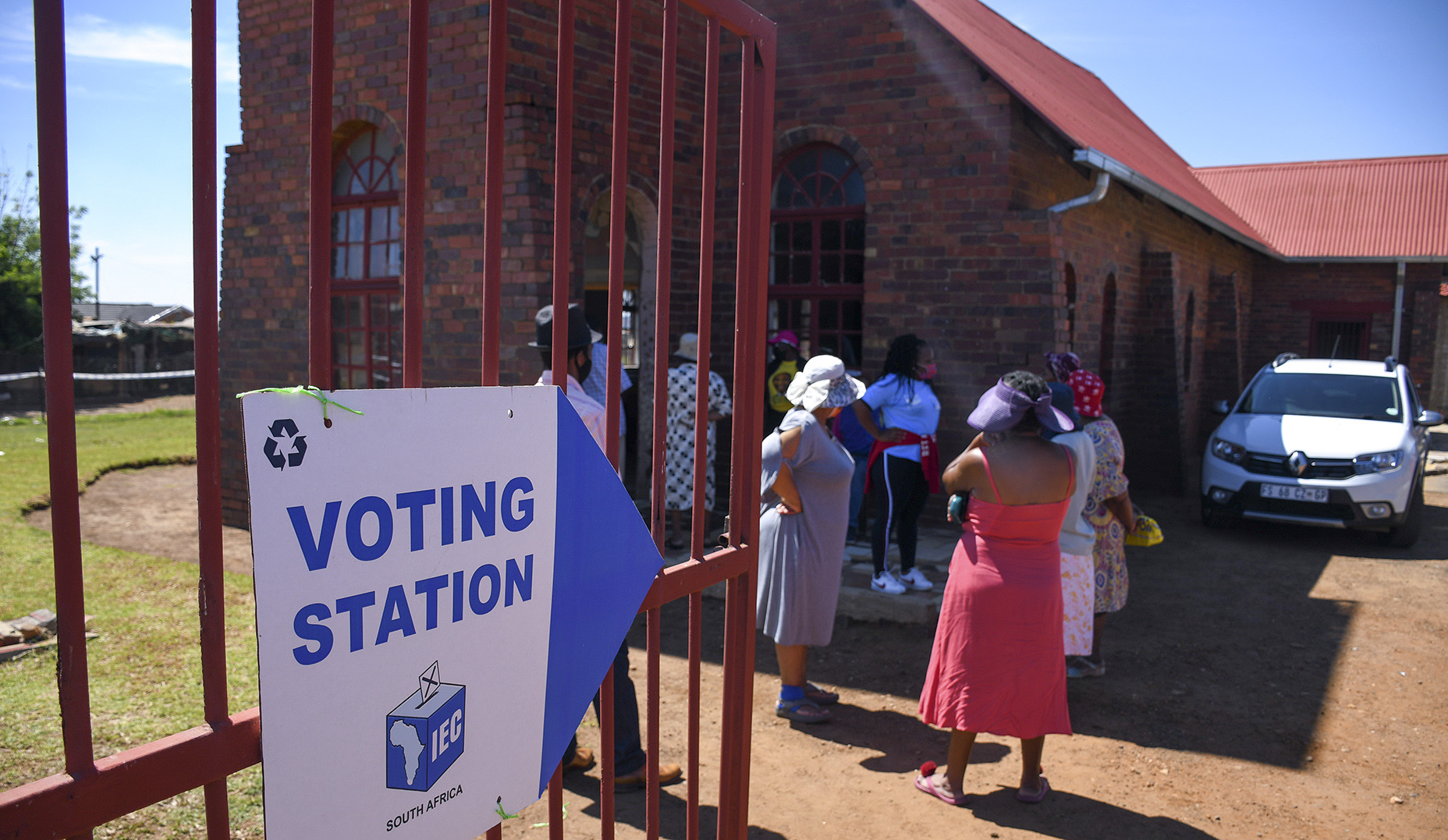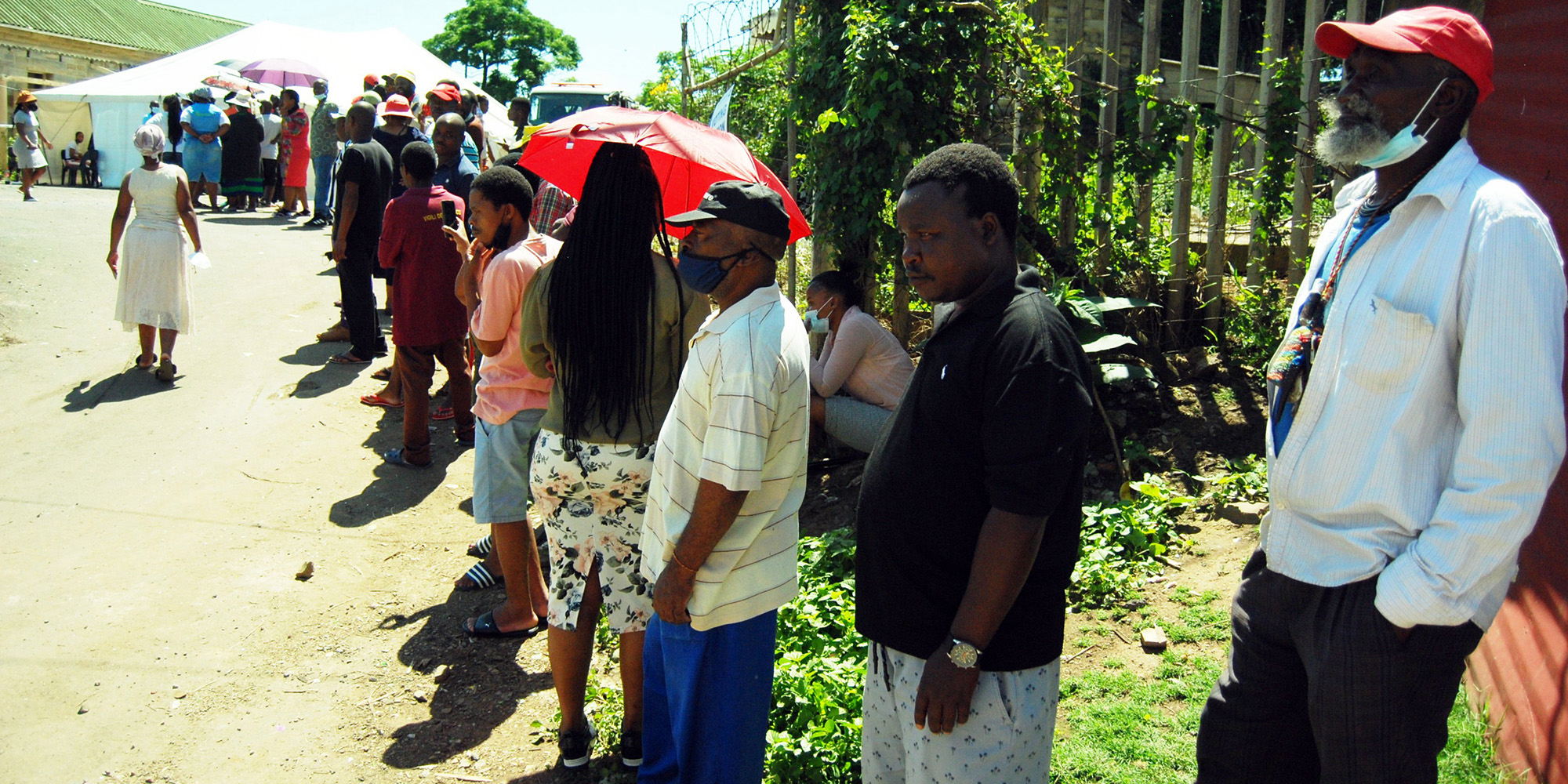Tuesday Editorial 2021 Elections
The great no-vote: South Africa’s return to minority rule

November 1, 2021, should be seen as another watershed moment in post-apartheid South Africa.
Who would have thought that barely a month before the 25th anniversary of the signing of the democratic Constitution, South Africa would return to minority rule. For this is effectively what has happened.

An IEC staff member assists an elderly voter on the evening of 1 November 2021 at ward 45, Rekgonne Primary School, Bloemfontein, Free State. (Photo: Lihlumelo Toyana)
Yesterday, in the local government elections, only a minority of eligible South Africans chose to vote. The vast majority either didn’t register or registered but then didn’t vote. The no-vote included tens of millions of people, most of them coming from South Africa’s swelling underclass, made up of people who are young, gifted, black… and poor.
It is a terrible irony that the biggest vote was the no-vote; the biggest political movement, the political party that doesn’t exist on the ballot; the most coherent statement on the elections, the incoherent abstention of the politically unorganised.
Yesterday, as voting took place, and as it became evident that by 4.30pm less than seven million people (26.3% of eligible voters) had cast their ballots, many political commentators used the word “apathy”. As manifestations of that “apathy”, they kept talking about the long weekend and the bad weather in parts of the country, as the factors that deterred people from voting.
Unfortunately, apathy’s the wrong word. People overcome worse obstacles than the weather on a daily basis if they think doing so will aid their wellbeing. Instead what we are witnessing is a profound alienation of the masses from those who work the political system and, dare we say it, from the democratic system itself, which is held to have failed to deliver.
That so many people should not have voted at a moment of crisis in South Africa, needs profound introspection, particularly by those who have political and economic power and are abusing it, or simply not using it to try and better the lives of the majority.
Remember, we are living in a time of unprecedented unemployment, unprecedented gender-based violence, a year that will see the highest natural death toll since the worst year of the Aids epidemic. This is a time in which basic education and health systems have broken down, a time of growing hunger and mental distress.
So many of these social issues play out at the level of local government and thus, you would have thought, people would have seized on the opportunity to capture local government and direct it to meet these needs?
They didn’t, partly because they know that the gangsters that control local government don’t roll over and play rule of law so easily.

Residents of Sharpeville, Gauteng, line up to cast their municipal vote on 1 November 2021, frustrated with the lack of change in their community, feeling like they have been forgotten by the state. (Photo: Julia Evans)
Breaking point
The no-vote shows our social and political contract is close to breaking.
The anger and desperation that lurks just below the surface of society, the thin line between respect for the rule of law and rejection of it, became evident in the eight days of looting in July, which cost billions of rands, thousands of jobs and 374 lives.
And yet, despite all the angst and hand-wringing that played out in business and formal political society, we quickly moved on from it. Four months later, next to nothing has happened other than the restoration of the measly R350 Social Relief of Distress Grant which, as our writer Tshabalira Lebakeng explains today here, is still surrounded by bureaucratic indignity and inaccessible to millions who need it.
So, yesterday’s great no-vote should be seen as another manifestation of this alienation. It is evidence that poor people are not stupid, but that they are less and less willing to play the ‘all is well with democracy’ game.
Truth be told, they don’t believe the present system can be made to work, so why participate in it? They don’t believe Ramaphosa’s promises. They contrast their lot with the lot of privileged people who are earnest advocates for voting, be they the media, official civil society, big business, or the political parties.
By not voting, what most people have done is cast a sharp light on a de facto form of minority rule that exists in South Africa anyway: they have just refused to put their legitimating stamp on it.

Residents line up to cast their vote at the KwaMashu hostel north of Durban in KwaZulu-Natal during the local government elections on 1 November 2021. (Photo: Phumlani Thabethe)
But if not democracy, then what?
Is there an alternative to majority rule, to free and fair elections, to elected local, provincial and national governments? If people choose not to vote, are they opting for some form of authoritarianism?
We, the privileged, might say no; we might wish not; after all, we say, “people died for this democracy”; our cerebral selves tell us the system is imperfect, but it’s better than dictatorship. But our views, whilst undoubtedly correct, are rooted in our relatively secure lives.
The poor think otherwise.
An Afrobarometer survey published in August 2021 proved to be a far more accurate predictor of the outcome of this election than the polling and media conjuring. In addition to finding low trust in the IEC (only 36%), the ANC (27%) and opposition political parties (24%) two-thirds of respondents (67%) said “they would be willing to give up elections if a non-elected government could provide security, housing, and jobs. Nearly half (46%) say they would be “very willing” to do so, with higher levels of support among younger and more educated respondents.”
Last week another Afrobarometer survey found that the majority of South Africans see unemployment as the country’s greatest priority and would support higher taxes for youth employment programmes.
These surveys are not surprising. What’s surprising is that we conveniently ignore them.
The writing is on the wall. Failing to address people’s real needs is a recipe for anarchy, populism and social fragmentation. The onus is squarely on the political and economic elite to act swiftly, with a range of concrete and immediate socio-economic measures such as a Basic Income Guarantee, to restore trust in the political system.
Failure to do so will hasten the end of democracy in South Africa. November 1 2021 was the day we got our written warning. DM/MC















 Become an Insider
Become an Insider
People need jobs, not grants.
For that to happen labour legislation has to be more employer and investor friendly. For that to happen the stranglehold that trade unions have on the ANC has to be broken. For that to happen the ANC has to be less dependent on coalitions to stay in power and instead rely on a good delivery record to stay in power.
Which will never happen.
Fully agree with you Hendrik. But if a lower voter turnout will contribute to a dismal ANC performance, I am all for it. For too long they have subjected the country to untold horrors. It also appears that the IEC was ill prepared. In many cases there were still long queues at certain voting stations like Centurian, St Helena Bay, etc, mainly non-ANC strongholds. It is almost as if the IEC was in alliance with the ANC. Even if the ANC remains the dominant party countrywide, an overall vote percentage of less than 50% will serve as a major wake-up call. They will either have to wake up fast, or die a slow death, unless off course they try a Mogabe!
67% are willing to drop democracy for authoritarianism? This may be clear evidence that the poor are, in fact, stupid.
It tells me that they equate failure of the ANC with failure of democracy itself. That IS stupid.
It tells me that they throw the baby out with the bath water without hesitation. That IS stupid.
It tells me that they think a change of power can only happen through revolution. That IS stupid.
Thank you, Mr Heywood, for pushing my opinion more favourably towards a 2-state solution. Exploitative Afro-Marxism can only end up as something unspeakably brutal, and thus something I do not care to languish under.
Until people realize that they have to help themselves rather than rely on a party or government to save them, they will continue not to vote or to vote for the wrong party. A government which creates an enabling environment for all to prosper, is not a government the ANC will ever provide.
Well maybe the great “no vote” will force the ANC to take more notice of growing grassroots civic organizations and their demands for disempowered citizens. Certainly this may happen at municipal level,and it needs to happen on a national scale as well
The problem is the institutions of government. If those who have the responsibility to manage the water, roads and other services. cannot or will not do their job there is no help in electing another party to government.
It is a shameful disgrace that 74% of registered voters (around 90% of voting population) decline to vote in an election that specifically determines how the live their daily lives. That they would prefer an authoritarian (read communist) government says (to me) that they have not actually experienced the benefits of a real democracy for most (but not all) of the last 27 years. In other words, not having experienced it, they do not understand what a democracy really is. Because of the ANC’s relentless pushing of the liberator narrative, and of course our apartheid history, it seems most people think democracy = vote ANC. The only alternative to this is not to vote. This position in a democracy, a hard-won one at that, is totally unacceptable, and no doubt one of the more depressing consequences of inadequate education. The solution is that the narrative must be challenged ideally by the most suitable institution, which in a real democracy should be the IEC. Unfortunately, they are not in the least “independent” but, like all State organs, staffed by cadres. In the end, the buck, in fact, the entire clash of buck, stops with the ANC.
I’m not sure that it’s true that 74% of registered voters didn’t vote. I think the 74% refers to all people eligible to vote.
It may not only be ‘apathy’. It can also mean complete loss of faith in a system of government that just doesn’t work anymore. It has been proven as such. No amount of voter turnout would have changed the performance of the state.
Traditionally, in Africa, abstention is the highest form of disapproval. Opposition had a tendency to become dangerous very quickly!
I wonder if this factor could be included in elections in this country?
If so, how would it be both included and measured?
The majority said ” they would be willing to give up elections if a non-elected government could provide security, housing, and jobs. ” … sounds like the solution is voting for the VBS looting EFF … and their not anointed leader who took the SABC for a ride, long before they latched onto the VBS lark!